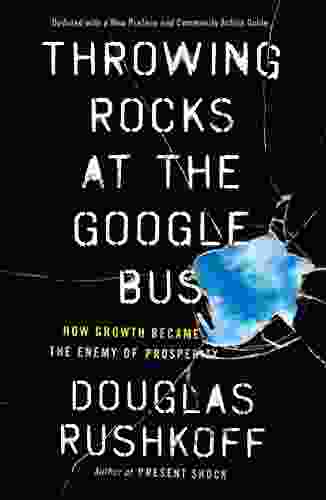How Growth Became the Enemy of Prosperity: A Must-Read for a Sustainable Future

4.3 out of 5
| Language | : | English |
| File size | : | 2895 KB |
| Text-to-Speech | : | Enabled |
| Screen Reader | : | Supported |
| Enhanced typesetting | : | Enabled |
| Word Wise | : | Enabled |
| Print length | : | 288 pages |
In his groundbreaking book, 'How Growth Became the Enemy of Prosperity,' renowned economist Robert Gordon argues that the relentless pursuit of economic growth has led us to a point where it is now undermining our prosperity. Gordon presents a compelling case, supported by a wealth of data and historical evidence, that economic growth has become a major threat to our planet and our well-being.
Gordon begins by examining the history of economic growth. He shows that while economic growth has been a powerful force for good in the past, it has also led to a number of negative consequences, including environmental degradation, inequality, and social unrest. Gordon argues that these negative consequences are now outweighing the benefits of economic growth.
One of the most damaging consequences of economic growth is environmental degradation. The burning of fossil fuels, the clearing of forests, and the overfishing of oceans are all contributing to the destruction of the planet's ecosystems. Gordon argues that we can no longer afford to ignore the environmental costs of economic growth.
Another major problem with economic growth is that it is leading to increasing inequality. The richest 1% of the population now owns more wealth than the bottom 99% combined. This inequality is not only unjust, but it is also economically unsustainable. When the majority of people are struggling to make ends meet, they do not have the money to buy the goods and services that businesses produce. This leads to a decline in economic growth and a vicious cycle of poverty and inequality.
Finally, Gordon argues that economic growth is leading to social unrest. As people become increasingly frustrated with the negative consequences of economic growth, they are more likely to engage in protests and other forms of social unrest. This unrest can destabilize governments and lead to violence.
Gordon concludes by arguing that we need to rethink our approach to economic growth. He proposes a number of policies that could help us to create a more sustainable and equitable economy. These policies include investing in renewable energy, reducing inequality, and promoting social justice.
'How Growth Became the Enemy of Prosperity' is a must-read for anyone who is concerned about the future of our planet and our well-being. Gordon's book provides a powerful indictment of the relentless pursuit of economic growth and offers a clear path towards a more sustainable future.
Key Insights from 'How Growth Became the Enemy of Prosperity'
- Economic growth has led to a number of negative consequences, including environmental degradation, inequality, and social unrest.
- The environmental costs of economic growth are now outweighing the benefits.
- Economic growth is leading to increasing inequality, which is both unjust and economically unsustainable.
- Economic growth is leading to social unrest as people become increasingly frustrated with the negative consequences of economic growth.
- We need to rethink our approach to economic growth and adopt policies that promote sustainability, equity, and social justice.
The Urgent Need for a New Approach to Economic Growth
The evidence is clear: the relentless pursuit of economic growth is undermining our planet and our well-being. We need to rethink our approach to economic growth and adopt policies that promote sustainability, equity, and social justice. This will not be easy, but it is essential for the future of our planet and our children.
Here are some specific policy recommendations that could help us to create a more sustainable and equitable economy:
- Invest in renewable energy and other sustainable technologies.
- Reduce inequality by raising the minimum wage, expanding access to education and healthcare, and reforming the tax system.
- Promote social justice by addressing the root causes of poverty and discrimination.
- Support degrowth and post-growth economic models that prioritize well-being over material consumption.
By adopting these policies, we can create a more sustainable and equitable economy that works for everyone, not just the wealthy few. We can build a future where our children and grandchildren can live healthy and fulfilling lives on a healthy planet.
4.3 out of 5
| Language | : | English |
| File size | : | 2895 KB |
| Text-to-Speech | : | Enabled |
| Screen Reader | : | Supported |
| Enhanced typesetting | : | Enabled |
| Word Wise | : | Enabled |
| Print length | : | 288 pages |
Do you want to contribute by writing guest posts on this blog?
Please contact us and send us a resume of previous articles that you have written.
 Book
Book Novel
Novel Page
Page Chapter
Chapter Text
Text Story
Story Genre
Genre Reader
Reader Library
Library Paperback
Paperback E-book
E-book Magazine
Magazine Newspaper
Newspaper Paragraph
Paragraph Sentence
Sentence Bookmark
Bookmark Shelf
Shelf Glossary
Glossary Bibliography
Bibliography Foreword
Foreword Preface
Preface Synopsis
Synopsis Annotation
Annotation Footnote
Footnote Manuscript
Manuscript Scroll
Scroll Codex
Codex Tome
Tome Bestseller
Bestseller Classics
Classics Library card
Library card Narrative
Narrative Biography
Biography Autobiography
Autobiography Memoir
Memoir Reference
Reference Encyclopedia
Encyclopedia Don Bentley
Don Bentley Derek Blasberg
Derek Blasberg Dermot Mcevoy
Dermot Mcevoy Dr Lena Edwards
Dr Lena Edwards Dreena Burton
Dreena Burton Dr Eman
Dr Eman Donald Richie
Donald Richie Dr Minerva Singh
Dr Minerva Singh Dianne Bilyak
Dianne Bilyak Diana Abu Jaber
Diana Abu Jaber Dionne Ford
Dionne Ford Dianne Chapman Mccleery
Dianne Chapman Mccleery Douglas Adams
Douglas Adams Dr Katayune Kaeni
Dr Katayune Kaeni Dorcas Smucker
Dorcas Smucker Dizzy Davidson
Dizzy Davidson Dr Fiona Mcpherson
Dr Fiona Mcpherson Donald Woods Winnicott
Donald Woods Winnicott Donnie Kanter Winokur
Donnie Kanter Winokur Don Nardo
Don Nardo
Light bulbAdvertise smarter! Our strategic ad space ensures maximum exposure. Reserve your spot today!

 Quentin PowellThe Incredible True Story of the Legendary Sailor the Japanese Couldn't Kill
Quentin PowellThe Incredible True Story of the Legendary Sailor the Japanese Couldn't Kill Eugene PowellFollow ·9.4k
Eugene PowellFollow ·9.4k Branson CarterFollow ·8.6k
Branson CarterFollow ·8.6k Todd TurnerFollow ·16k
Todd TurnerFollow ·16k Gabriel BlairFollow ·3.2k
Gabriel BlairFollow ·3.2k Ethan MitchellFollow ·9.9k
Ethan MitchellFollow ·9.9k Robert BrowningFollow ·13.5k
Robert BrowningFollow ·13.5k Casey BellFollow ·8.6k
Casey BellFollow ·8.6k Jack ButlerFollow ·12.4k
Jack ButlerFollow ·12.4k

 J.D. Salinger
J.D. SalingerThe Quintessential American Cook: A Culinary Journey with...
Prologue: The Man...

 Franklin Bell
Franklin BellIntroducing Romanticism: A Literary Guide to the Romantic...
Romanticism was a...

 Denzel Hayes
Denzel HayesThe Untold And Inspiring Story Of Eric Liddell Hero Of...
The Olympian Who Defied...

 Oscar Wilde
Oscar WildeDiscover the Enchanting Adventure of Arthur Woody and the...
Immerse Yourself in a World of Mystery,...

 Fernando Bell
Fernando BellAlibaba: The House That Jack Ma Built
The Rise of the Chinese E-Commerce Giant ...

 Leo Tolstoy
Leo TolstoyCrossing Continents: A History of Standard Chartered Bank
By John M. Smith Crossing...
4.3 out of 5
| Language | : | English |
| File size | : | 2895 KB |
| Text-to-Speech | : | Enabled |
| Screen Reader | : | Supported |
| Enhanced typesetting | : | Enabled |
| Word Wise | : | Enabled |
| Print length | : | 288 pages |










